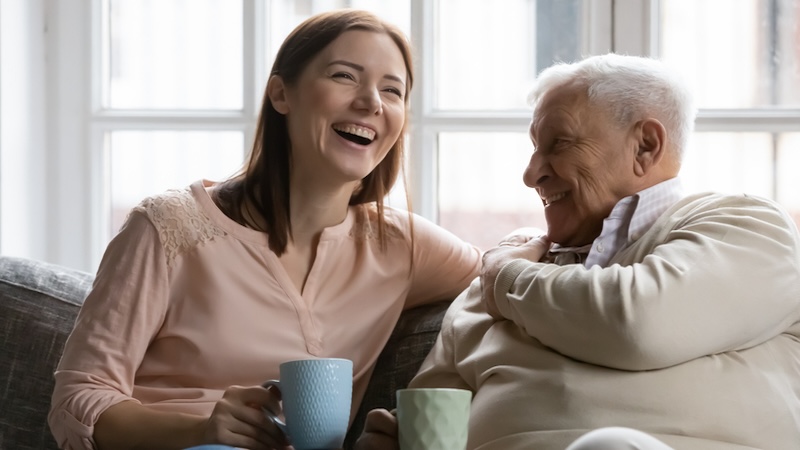“Every day is precious,” writes Terri L. Jones, celebrating the value of visits with her aging father. “When my father had a stroke six years ago … I decided it was time I supported this man, whom I still called ‘Daddy,’ in return.”
I did not grow up with my father. Because my parents divorced when I was 7 and my mother moved us three hours away when I was 8, my sister and I only spent random weekends, holidays, and a couple weeks over the summer with him and our stepmother when we were young. He taught us to fish and play blackjack. We went to Civil War battlefields, ate steamed crabs, and played Skee-Ball together. He was the fun dad, not the disciplinarian like most fathers.
A kinship
However, despite the physical distance between us and the minimal time we spent together, my father and I have always been close. Not only are our personalities similar, but my father also played a significant role in my adult life because – as sexist as it might sound – I didn’t have a husband until my early 50s, so I always turned to my dad for things like car problems, repairing rotted porch steps, and installing a sump pump in my basement. And then he repeatedly instructed me on how to get the darn sump pump to work as water poured under the door!
But aside from his stereotypically male brand of support, my father also was there for me emotionally. The incident that I remember the most was when my beloved dog Rufus died in the wee hours of a Sunday morning. I turned to my sister for help burying Rufus in my backyard, and she called our dad – on what coincidentally was Father’s Day – to figure out how to keep animals from digging up his burial plot.
After she and one of my neighbors managed to unceremoniously put my pup to rest in a Rubbermaid bin under landscape pavers – while I wailed a few feet away – my father made the four-hour trip to spend a week with me. Because I worked from home, he was worried about my being alone. Every morning, we ate oatmeal together and he distracted me in the evenings with television and idle chitchat. He made that first week without Rufus bearable and our bond even stronger.
My turn: embracing the value of the visits
 When my father had a stroke six years ago and was diagnosed with vascular dementia – and a couple years later my husband had the opportunity for remote work – I decided it was time I supported this man, whom I still called “Daddy,” in return. So, we packed up our home and animals and moved to within an hour’s drive of my father and stepmother to help however we could.
When my father had a stroke six years ago and was diagnosed with vascular dementia – and a couple years later my husband had the opportunity for remote work – I decided it was time I supported this man, whom I still called “Daddy,” in return. So, we packed up our home and animals and moved to within an hour’s drive of my father and stepmother to help however we could.
For the past four years, I’ve spent at least one day a week with my father and every single one of those days has been precious. Every time I walk into their living room, where he’s generally kicked back in his recliner, his face lights up as if it’s been months since he’s seen me. He always asks about the “old man” (my husband) and “the kids” (my dogs and cat), whose names he can’t ever recall.
When I kick off my shoes and prop up my feet on the coffee table beside his chair, he tells the same joke, right on cue, about how big my feet are (they are not!). And in the same breath, he tells me how pretty they are because they look just like his (they do!).
Also from Terri L. Jones:
Advice on Caring for Aging Parents
Safeguarding a Senior’s Dignity
The small things
When my stepmother runs errands or goes to the doctor, it’s just the two of us. Typically, we watch my father’s favorite show, “Port Protection Alaska,” about surviving off the grid. He’s watched most of the episodes numerous times but they’re always new to him. When someone catches a fish, I ask my father, who was an avid fisherman, what kind of the fish they’ve just pulled in. In other episodes, someone might be troubleshooting smoke coming from a trailer or building some sort of gadget or structure and I ask him to explain what they’re doing. He doesn’t always know, but he always tries to answer me. I think he enjoys returning to this familiar dynamic where I am the kid and he is the father who has all the answers.
During his show, my father tries not to nod off, but he often does, and when he awakes, I offer him his regular lunch of hummus on Ritz crackers and yogurt. If my stepmother has bought cookies that week, we share some cookies for dessert (he knows that I’ll always give him an extra if he wants it!). Afterward, I get rid of the evidence, dusting off the layer of crumbs on his shirt, before my stepmom returns home.
Sometimes, we talk about the friends whom I know have visited him recently. On other occasions, we talk about his grandchildren (my sister’s kids) and his great-grandchildren, who live hours away and whom he doesn’t see often. When my dad asks how old the kids are now, he’s always surprised when I tell him. In his memory, my 25- and 30-year-old niece and nephew will always be little children running around the house and jumping in Paw Paw’s lap. He’s equally shocked to learn that his eldest daughter is turning 65 this year, which usually leads to the question, “So how old am I?” His eyes widen to learn that he’s 86!
Memory of love
Yesterday, when I was leaving, I gave my father a hug and a kiss and he told me how much he loves me, which he always does. He then thanked me for coming, which he hasn’t done before. Laughing, I asked if it was because I gave him cookies. While my dad’s brain often betrays him, he is sometimes able to express himself so perfectly … and powerfully: “No,” he replied, “it’s because I just like to see you sitting beside me.”
While he won’t remember saying this or maybe even my being there, he won’t forget the love. Neither will I.
Related: Moving Aging Parents into Your Home




